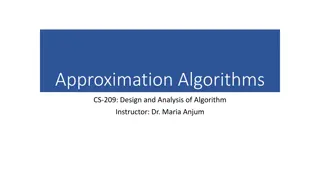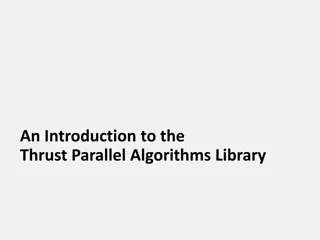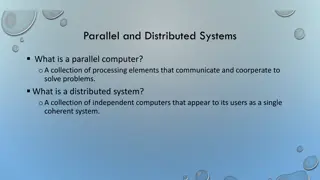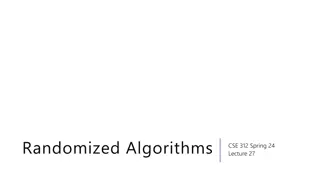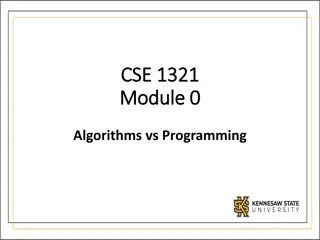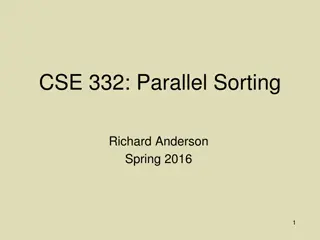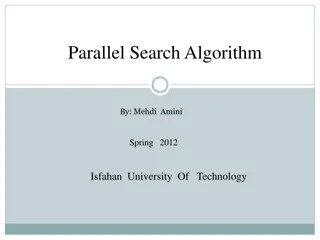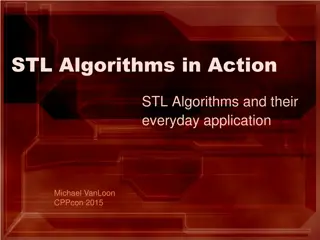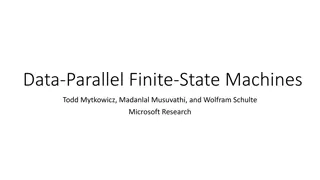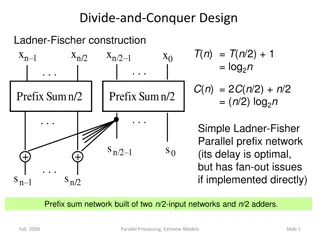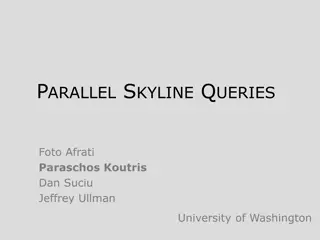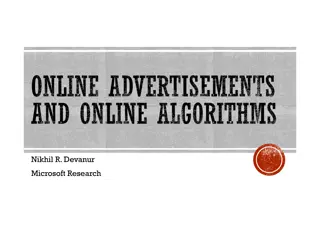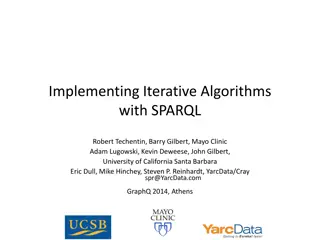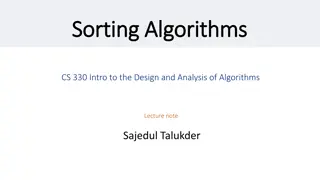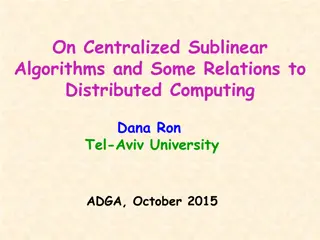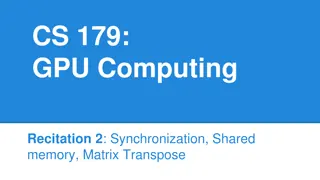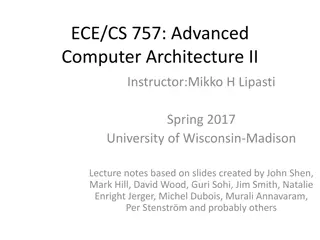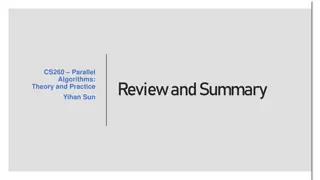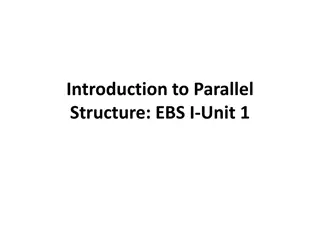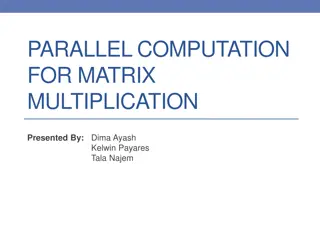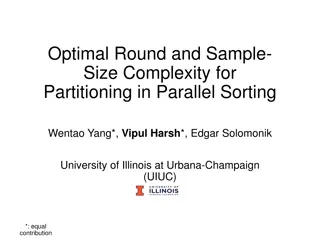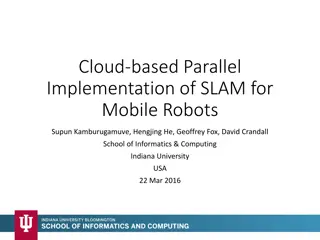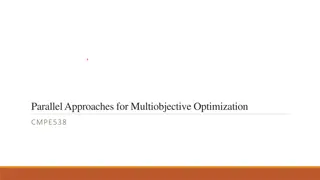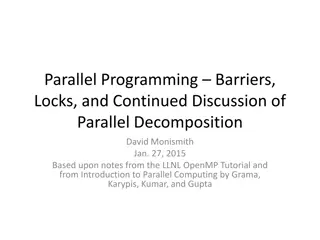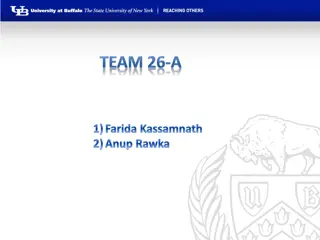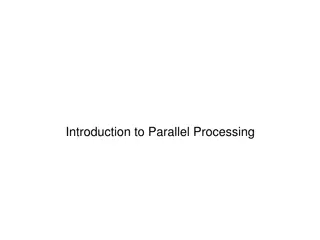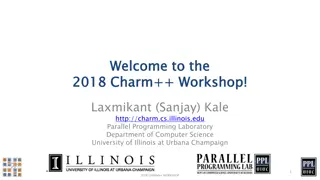Understanding Algorithms and Programming Fundamentals
Learn about algorithms, programming, and abstraction in computing. Explore the definition and properties of algorithms, the relationship between algorithms and programming, and the concept of abstraction. Discover how algorithms are like recipes and how abstraction simplifies complex tasks in comput
1 views • 17 slides
Near-Optimal Quantum Algorithms for String Problems - Summary and Insights
Near-Optimal Quantum Algorithms for String Problems by Ce Jin and Shyan Akmal presents groundbreaking research on string problem solutions using quantum algorithms. The study delves into various key topics such as Combinatorial Pattern Matching, Basic String Problems, Quantum Black-box Model, and mo
0 views • 25 slides
Understanding Approximation Algorithms: Types, Terminology, and Performance Ratios
Approximation algorithms aim to find near-optimal solutions for optimization problems, with the performance ratio indicating how close the algorithm's solution is to the optimal solution. The terminology used in approximation algorithms includes P (optimization problem), C (approximation algorithm),
2 views • 10 slides
Understanding Parallel and Distributed Computing Systems
In parallel computing, processing elements collaborate to solve problems, while distributed systems appear as a single coherent system to users, made up of independent computers. Contemporary computing systems like mobile devices, IoT devices, and high-end gaming computers incorporate parallel and d
1 views • 11 slides
Introduction to Thrust Parallel Algorithms Library
Thrust is a high-level parallel algorithms library, providing a performance-portable abstraction layer for programming with CUDA. It offers ease of use, distributed with the CUDA Toolkit, and features like host_vector, device_vector, algorithm selection, and memory management. With a large set of al
0 views • 18 slides
Understanding Parallel and Distributed Systems in Computing
A parallel computer is a collection of processing elements that collaborate to solve problems, while a distributed system comprises independent computers appearing as a single system. Contemporary computing systems, like mobile devices and cloud platforms, utilize parallel and distributed architectu
0 views • 11 slides
Combining Graph Algorithms with Data Structures and Algorithms in CSE 373 by Kasey Champion
In this lecture, Kasey Champion covers a wide range of topics including graph algorithms, data structures, coding projects, and important midterm topics for CSE 373. The lecture emphasizes understanding ADTs, data structures, asymptotic analysis, sorting algorithms, memory management, P vs. NP, heap
0 views • 38 slides
Understanding Randomized Algorithms: A Deep Dive into Las Vegas and Monte Carlo Algorithms
Randomized algorithms incorporate randomness into computations, with Las Vegas algorithms always providing the correct answer but varying in time, while Monte Carlo algorithms occasionally give wrong answers. Quick Sort is a classic Las Vegas algorithm that involves pivoting elements for sorting. Ch
4 views • 21 slides
Understanding Shift Registers: Introduction and Classification
Explore the world of shift registers, including buffer registers, and different modes of operation like serial in/serial out, serial in/parallel out, parallel in/serial out, and parallel in/parallel out. Learn about the construction, operation, and classification of registers in digital systems.
1 views • 24 slides
Understanding Shift Registers in Sequential Logic Circuits
Shift registers are sequential logic circuits used for storing digital data. They consist of interconnected flip-flops that shift data in a controlled manner. This article explores different types of shift registers such as Serial In - Serial Out, Serial In - Parallel Out, Parallel In - Serial Out,
2 views • 9 slides
Understanding Algorithms and Programming: A Visual Introduction
Explore the fundamental concepts of algorithms and programming through visual representations and practical examples. Learn about algorithmic thinking, abstraction, recipe-like algorithms, and the importance of logical steps in accomplishing tasks. Discover how algorithms encapsulate data and instru
1 views • 17 slides
Distributed Algorithms for Leader Election in Anonymous Systems
Distributed algorithms play a crucial role in leader election within anonymous systems where nodes lack unique identifiers. The content discusses the challenges and impossibility results of deterministic leader election in such systems. It explains synchronous and asynchronous distributed algorithms
2 views • 11 slides
Understanding Parallel Circuits in Electronics
Explore topics such as resistors in parallel, voltage distribution, Kirchhoff's current law, resistance calculations, and practical applications in parallel circuits. Dive into problem-solving exercises and grasp concepts like current dividers, total resistance calculations, and power distribution i
0 views • 20 slides
Understanding Parallel Sorting Algorithms and Amdahl's Law
Exploring the concepts of parallel sorting algorithms, analyzing parallel programs, divide and conquer algorithms, parallel speed-up, estimating running time on multiple processors, and understanding Amdahl's Law in parallel computing. The content covers key measures of run-time, divide and conquer
1 views • 40 slides
Mathematical Analysis of Algorithms in CMPE371 - Fall 2023-2024
Explore the mathematical analysis of algorithms in CMPE371 for Fall 2023-2024, focusing on non-recursive and recursive algorithms. Learn how to analyze non-recursive algorithms by deciding on input size parameters, identifying basic operations, and simplifying summations. Dive into recursive algorit
1 views • 31 slides
Parallel Search Algorithm - Types and Approaches
Exploring parallel search algorithms in artificial intelligence, this study delves into various types like Sequential Depth First Search, Sequential Best First Search, and their parallel counterparts. The research outlines the process of searching for elements in initial and goal states, emphasizing
0 views • 24 slides
Pseudodeterministic Algorithms and Their Application in Search Problems
Pseudodeterministic algorithms provide a unique approach to the search problem associated with binary relations, offering an error reduction technique while sacrificing the ability to approximate the average value of a function. By introducing m-pseudodeterministic and pseudo-pseudodeterministic alg
1 views • 6 slides
Understanding STL Algorithms: A Practical Guide
Explore the world of STL algorithms through an insightful discussion on the definition of algorithms, the advantages of using STL algorithms over raw loops, and the different classes of STL algorithms available. Discover how these pre-built libraries can enhance your programming efficiency and code
1 views • 99 slides
Exploring the Role of Algorithms in Game Design
Delve into the world of algorithms in game design, from understanding the fundamental concept of algorithms to their pervasive presence in various aspects of gaming, such as military simulations, medical simulations, and gameplay mechanics. Explore how algorithms shape experiences in different types
0 views • 10 slides
Evolutionary Computation and Genetic Algorithms Overview
Explore the world of evolutionary computation and genetic algorithms through a presentation outlining the concepts of genetic algorithms, parallel genetic algorithms, genetic programming, evolution strategies, classifier systems, and evolution programming. Delve into scenarios in the forest where gi
0 views • 51 slides
Data-Parallel Finite-State Machines: A Breakthrough Approach
This research discusses a new method for breaking data dependencies in data-parallel finite-state machines. It highlights the importance of FSMs in various algorithms and the need for parallel versions in processing large data sets. The study explores breaking data dependences with enumeration and t
0 views • 19 slides
Parallel Prefix Networks in Divide-and-Conquer Algorithms
Explore the construction and comparisons of various parallel prefix networks in divide-and-conquer algorithms, such as Ladner-Fischer, Brent-Kung, and Kogge-Stone. These networks optimize computation efficiency through parallel processing, showcasing different levels of latency, cell complexity, and
1 views • 21 slides
Understanding Parallel Skyline Queries in Distributed Systems
Explore the concept of skyline queries in parallel computing, focusing on non-dominated points in a d-dimensional set. Learn about efficient algorithms, massively parallel models, communication strategies, and the application of broadcast steps. Enhance your knowledge of skyline computation processe
0 views • 27 slides
Online Advertising and Algorithms: Insights and Simplifications
Explore the world of online advertisements and algorithms through insightful discussions on online advertising, modern developments in online algorithms, and practical optimization strategies like budgeted allocation. Delve into topics such as decision-making under uncertainty, accessing algorithms,
1 views • 22 slides
Implementing Iterative Algorithms with SPARQL
This comprehensive guide explores the implementation of iterative algorithms with SPARQL, focusing on YarcData/Cray's approach to using these algorithms. It covers YarcData's interest in graphs, the Urika appliance, iterative algorithms in machine learning, implementation approach, and algorithms im
1 views • 12 slides
Overview of Sorting Algorithms and Quadratic Sorting - CS 330 Lecture Notes
Sorting algorithms play a crucial role in computer science and computing tasks, consuming a significant portion of computing power. Various algorithms such as Bubble Sort, Selection Sort, and Insertion Sort are discussed for sorting a list of values efficiently. Quadratic sorting algorithms like Sel
0 views • 30 slides
Parallel Programming Directives and Concepts
Learn about parallel programming directives like Diretiva.parallel and #pragma omp.parallel, which allow code to be executed by multiple threads simultaneously. Explore concepts such as defining parallel regions, setting the number of threads, and utilizing OpenMP directives for parallel for loops.
0 views • 39 slides
Understanding Sublinear Algorithms and Graph Parameters in Centralized and Distributed Computing
Centralized sublinear algorithms and their relation to distributed computing are explored, emphasizing the efficiency of algorithms in processing large inputs in sublinear time. Examples of sublinear algorithms for various objects are provided, along with the computation and approximation of graph p
1 views • 34 slides
GPU Computing and Synchronization Techniques
Synchronization in GPU computing is crucial for managing shared resources and coordinating parallel tasks efficiently. Techniques such as __syncthreads() and atomic instructions help ensure data integrity and avoid race conditions in parallel algorithms. Examples requiring synchronization include Pa
0 views • 22 slides
Understanding Parallel Software in Advanced Computer Architecture II
Exploring the challenges of parallel software, the lecture delves into identifying and expressing parallelism, utilizing parallel hardware effectively, and debugging parallel algorithms. It discusses functional parallelism, automatic extraction of parallelism, and finding parallelism in various appl
0 views • 86 slides
CS260 Parallel Algorithms: Theory and Practice Review
This review covers essential topics from the CS260 Parallel Algorithms course by Yihan Sun, focusing on key concepts such as scheduler programs, cost models, reduce and scan techniques, PRAM models, atomic primitives, small algorithms, the master theorem, and sorting algorithms like Quicksort and Me
0 views • 25 slides
Mastering Parallel Structure in Business Communication
Understanding and implementing parallel structure in business communication is essential for clear, effective, and professional writing. Explore the nuances of parallelism, such as using correlative conjunctions like "not only...but also," to ensure consistency and coherence in your written work. Le
0 views • 21 slides
Parallel Computation for Matrix Multiplication
Matrix multiplication is a fundamental operation with diverse applications across scientific research. Parallel computation for matrix multiplication involves distributing the computational workload over multiple processors, improving efficiency. Different algorithms have been developed for multiply
0 views • 36 slides
Optimal Round and Sample-Size Complexity for Parallel Sorting Partitioning
This paper explores optimal round and sample-size complexity for partitioning in parallel sorting, discussing parallel partitioning approaches such as sampling and histogramming. It presents a model where processors communicate a set number of keys per round, highlighting the trade-off between round
0 views • 18 slides
Cloud-based Parallel Implementation of SLAM for Mobile Robots
This research focuses on a cloud-based parallel implementation of Simultaneous Localization and Mapping (SLAM) for mobile robots. It explores the use of cloud computing to enhance the efficiency and accuracy of SLAM algorithms, enabling robots to build maps and estimate their positions simultaneousl
0 views • 11 slides
Parallel Approaches for Multiobjective Optimization in CMPE538
This lecture provides a comprehensive overview of parallel approaches for multiobjective optimization in CMPE538. It discusses the design and implementation aspects of algorithms on various parallel and distributed architectures. Multiobjective optimization problems, often NP-hard and time-consuming
0 views • 20 slides
Understanding OpenMP Barriers and Locks in Parallel Programming
Exploring the concepts of OpenMP barriers and locks in parallel programming, this discussion covers the importance of synchronization through barriers, the use of lock variables for finer control over synchronization, and examples like the Dining Philosophers problem. Learn how these primitives faci
0 views • 22 slides
Enhancing Sorting Performance with Parallel Algorithms
Sorting is a crucial task in computer science, with data sizes increasing, parallel algorithms offer improved performance. This study explores enhancing Quick Sort using parallel computing, determining optimal processor numbers for efficiency gains.
0 views • 11 slides
Understanding Parallel Processing Fundamentals
This overview delves into the basics of parallel computing, covering parallel memory architectures, programming models, design issues, and parallelizing serial programs. Parallel computing involves leveraging multiple compute resources simultaneously to enhance computational efficiency and solve pro
0 views • 35 slides
Introduction to Charm++ Programming Framework
Charm++ is a generalized approach to parallel programming that offers an alternative to traditional parallel programming languages like MPI, UPC, and GA. It emphasizes overdecomposition, migratability, and asynchrony to enhance parallel program performance and efficiency. The framework uses indexed
0 views • 43 slides


